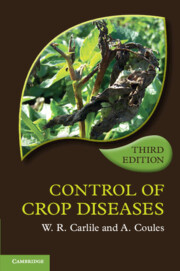Book contents
- Frontmatter
- Contents
- Preface to the third edition
- Preface to the second edition
- Preface to the first edition
- Trademarks and registered trademarks
- 1 Introduction
- 2 Major crop diseases in the UK
- 3 Diagnosis of disease in crops
- 4 Eradication, Certification and Legislation
- 5 Crop husbandry and cultural practices
- 6 Production and use of crop cultivars resistant to disease
- 7 Fungicides and Biological Control
- 8 Current Trends and Future Prospects
- Bibliography and further reading
- Index
- Plate Section
Preface to the third edition
Published online by Cambridge University Press: 05 May 2012
- Frontmatter
- Contents
- Preface to the third edition
- Preface to the second edition
- Preface to the first edition
- Trademarks and registered trademarks
- 1 Introduction
- 2 Major crop diseases in the UK
- 3 Diagnosis of disease in crops
- 4 Eradication, Certification and Legislation
- 5 Crop husbandry and cultural practices
- 6 Production and use of crop cultivars resistant to disease
- 7 Fungicides and Biological Control
- 8 Current Trends and Future Prospects
- Bibliography and further reading
- Index
- Plate Section
Summary
An extensive revision of the chapter on chemical control of disease and expanded coverage of both diagnosis of disease and deployment of resistant cultivars form part of this new edition. Diagnosis of disease is becoming ever more sophisticated, and if transgenic crops become as acceptable in the European Union as elsewhere in the world, major advances in durable disease control without recourse to the extensive use of fungicides may at last be realised.
The author of previous editions (W. R. Carlile) has worked almost solely with protected horticultural crops over the period 2006--2011, and has admired the careful use of cultural practice, sanitation and adoption of non-chemical methods for pest and disease control: a very different scenario from arable crops, with the principal link being the extraordinary progress in disease diagnosis based on molecular technologies, and perhaps to be surpassed by developments in nanotechnology.
In this respect Bill Carlile would like to pay tribute to colleagues at Bord na Mona in Newbridge, including James Spillane, Dearbhail Ni Chualain, Colman Hynes and Sarah Lombard, for their good company and encouragement. Equally, he would wish to acknowledge the continued interest and help from past graduates of Nottingham Trent University, particularly Chris Danks, now at Forsite Diagnostics; Mark Stevens, at Brooms Barn research station of the UK BBSRC; and staff of Eurofins (Agrisearch) at Melbourne, Derbyshire, especially Owen Scrimshaw.
- Type
- Chapter
- Information
- Control of Crop Diseases , pp. ix - xPublisher: Cambridge University PressPrint publication year: 2012

